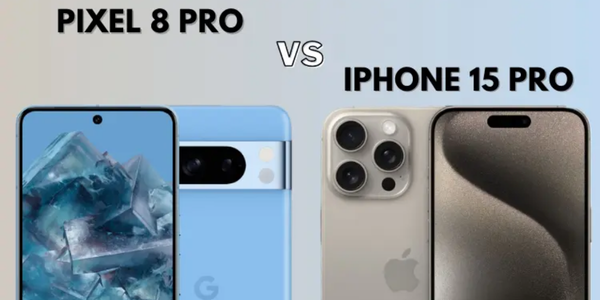Smartphones are no longer just gadgets — they’re our cameras, assistants, entertainment hubs, and personal organizers. If you’ve been debating whether to go with Apple’s iPhone or Google’s Pixel, you’re not alone. In this detailed comparison between iPhone vs Pixel, we’ll break down the key differences, highlight the strengths of each, and help you choose the device that best suits your needs.
Whether you’re an Apple loyalist or considering a switch to Android, this guide has everything you need.
iPhone vs Pixel: A Quick Overview
Before diving into the nitty-gritty, here’s a quick snapshot comparison between Apple’s iPhone and Google’s Pixel smartphones.
| Feature | iPhone (e.g., iPhone 15 Pro) | Pixel (e.g., Pixel 8 Pro) |
|---|---|---|
| OS | iOS | Android (Pixel UI) |
| Processor | A17 Pro | Google Tensor G3 |
| Camera | Industry-leading video + photo | AI-powered photo tools |
| Updates | Long-term software support | Frequent updates (Android-first) |
| Ecosystem | Seamless Apple ecosystem | Google service integration |
| Price Range | Premium ($999+) | Competitive ($699–$999) |
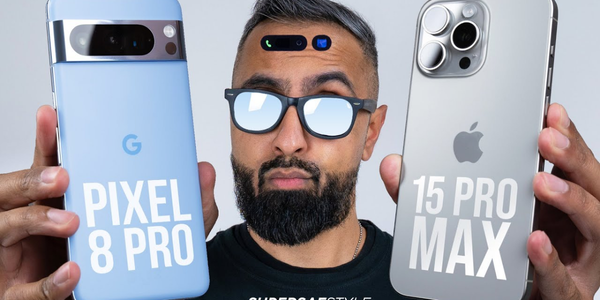
📱 Design and Build Quality
iPhone: Refined and Iconic
Apple continues to evolve the iPhone’s sleek design while keeping its iconic look. With a surgical-grade stainless steel frame (or titanium in the 15 Pro), ceramic shield front, and matte glass back, the iPhone feels luxurious in hand.
-
Color Options: Sophisticated, minimalist tones.
-
Durability: IP68 water resistance, highly scratch-resistant.
-
Display: Super Retina XDR OLED, bright and color-accurate.
Pixel: Minimalist and Modern
The Pixel embraces a modern, understated look with bold colors and the signature camera bar.
-
Color Options: Fun, vibrant, and expressive.
-
Material: Polished aluminum frame with matte glass.
-
Display: OLED with high refresh rate (up to 120Hz).
Verdict: iPhones exude premium elegance, while Pixels bring a fun, Googley charm. Design is subjective — both excel in craftsmanship.
⚙️ Performance and Speed
iPhone: Blazing Fast with A-Series Chips
Apple’s custom-designed A17 Pro chip is a performance powerhouse. Whether you’re gaming, editing videos, or multitasking, the iPhone delivers unmatched speed and efficiency.
-
Real-World Example: Apps load instantly, and gaming experiences are console-like (thanks to Apple Metal).
-
Battery Optimization: Efficient chip design equals long battery life.
Pixel: Smart AI-Powered Performance
The Pixel 8 Pro runs on Google’s Tensor G3, designed not just for raw speed but for advanced AI and ML (machine learning) tasks.
-
AI Magic: Features like real-time translation, call screening, and Magic Eraser are made possible by the Tensor chip.
-
Everyday Speed: Fast, fluid, and optimized for Android.
Verdict: iPhone wins in raw performance; Pixel shines in smart, AI-enhanced experiences.
📷 Camera: Capturing Moments Differently
iPhone: Professional-Grade Video and Photo
Apple’s camera system is known for consistency and realism. iPhone 15 Pro, for instance, introduces improved low-light photography and cinematic video capabilities.
-
Key Features:
-
ProRAW & ProRes video recording.
-
Natural color reproduction.
-
Excellent stabilization for video creators.
-
Pixel: Computational Photography at Its Best
Google redefines what smartphone cameras can do — even with smaller sensors — thanks to computational photography.
-
AI Features:
-
Magic Eraser
-
Best Take (combine the best faces from a burst)
-
Astrophotography Mode
-
-
Color Science: Vibrant, contrast-heavy images that pop.
Verdict: iPhone leads for video quality and realism; Pixel dominates with AI-enhanced photo creativity.
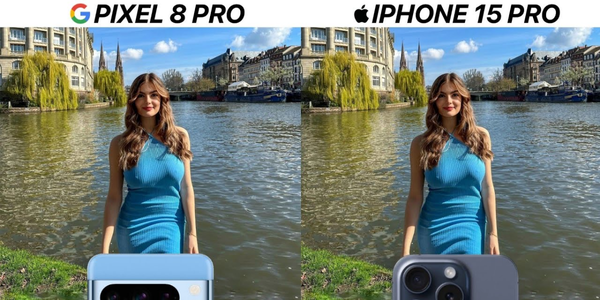
🔐 Software and Ecosystem
iPhone: The Walled Garden of Harmony
iOS offers a smooth, intuitive, and consistent user experience. If you own other Apple products, the integration is seamless.
-
Continuity Features: Handoff, AirDrop, FaceTime on Mac, and iMessage.
-
Privacy First: Apple emphasizes on-device processing and transparency.
Pixel: Pure Android + Google Intelligence
Pixels offer the cleanest Android experience with exclusive access to the latest Android versions and updates straight from Google.
-
Google Services Integration: Google Assistant, Gmail, Google Photos.
-
Exclusive Android Features: At-a-glance widgets, adaptive theming, and more.
Verdict: Choose iPhone for a cohesive Apple ecosystem; go with Pixel for cutting-edge Android features and Google smarts.
🔋 Battery Life and Charging
iPhone
-
Battery Life: Excellent power efficiency.
-
Charging: Lightning (soon USB-C), supports MagSafe wireless charging.
-
Battery Health: Industry-leading longevity with optimization.
Pixel
-
Battery Life: Solid but varies based on usage.
-
Charging: USB-C fast charging, supports Qi wireless charging.
-
Adaptive Battery: Learns usage patterns to extend battery life.
Verdict: iPhones generally edge out Pixels in battery endurance, but both have fast-charging and wireless options.
💸 Price and Value
| Model | Starting Price |
|---|---|
| iPhone 15 Pro | $999 |
| iPhone 15 | $799 |
| Pixel 8 Pro | $999 |
| Pixel 8 | $699 |
-
iPhone: Premium price for premium hardware and ecosystem.
-
Pixel: Competitive pricing, even with flagship features.
Verdict: Pixel offers better value for budget-conscious users; iPhones justify their price with polish and longevity.
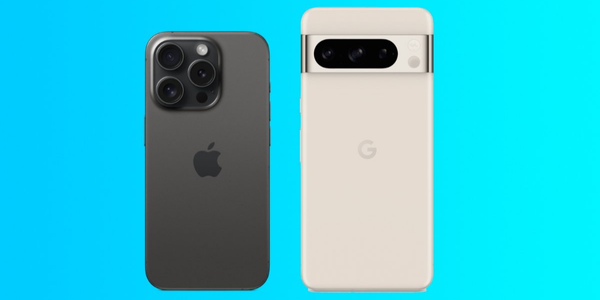
🔄 Updates and Longevity
iPhone
-
Apple offers software updates for 5–6 years.
-
Devices retain resale value extremely well.
Pixel
-
Google now promises 7 years of updates (starting with Pixel 8 series).
-
Pixels get Android updates before any other phone.
Verdict: Both now offer long-term support — a big win for consumers.
📊 Final Verdict: Which One Should You Choose?
Choosing between the iPhone and Pixel ultimately depends on what matters most to you.
Choose iPhone If You:
-
Already use other Apple products.
-
Want the best video and camera consistency.
-
Prefer iOS design and App Store reliability.
-
Value long-term support and resale value.
Choose Pixel If You:
-
Love Google services and Assistant.
-
Prefer Android customization.
-
Want powerful AI features like Magic Eraser and live translation.
-
Appreciate a great value-to-price ratio.
🤔 Real-World User Scenarios
-
Content Creators: iPhone’s ProRes and stabilization are unbeatable for mobile videography.
-
Students and Travelers: Pixel’s real-time translation and call screening are game-changers.
-
Privacy Advocates: Both brands take privacy seriously, but Apple markets it more prominently.
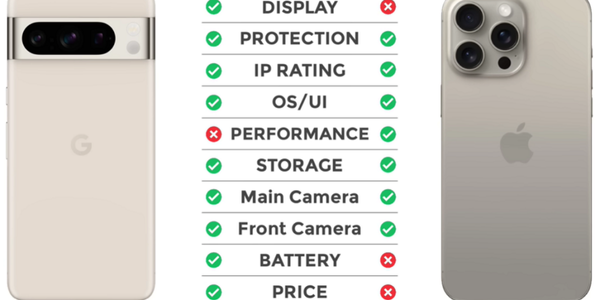
🎯 Conclusion
There’s no one-size-fits-all answer in the comparison between iPhone vs Pixel. Each phone brings unique strengths to the table. If possible, try them in-store or borrow a friend’s device for a day — real-world use often tells a deeper story than specs alone.
💬 What’s Your Pick?
Have you used both? Thinking of switching from iPhone to Pixel or vice versa?
Drop your thoughts in the comments below!
📚 Also, explore our related guides:
